There is a civ that got a sneaky secret stealth buff in BNW: Sweden. The unique ability about giving away great people to city-states never looked all that useful... but now in BNW we have three extra separate cost counters for Great People production. In other words, let's make and give away all those cheap artistic Great People. Plus BNW also adds extra GPP buffs from the world council and ideologies.
Obviously going for city-states means a diplomatic victory and max Patronage. And as with my other experiments with policy trees, I want to try Patronage as fast as possible rather than after Tradition/Liberty as usual. I'd like to get to the classical era after as few policies as possible, ideally only two. The standard schedule if you don't get any culture ruins is the Tradition opener on turn 25, second policy (Aristocracy) 30/4 = 8 turns later on turn 33, then the third policy 60/4 = 15 turns later on turn 48. The fastest era entry is Optics which can come by the low 40's, though it's junk as a tech. The next fastest entry is Mathematics, although that's tough to get by turn 48 and doesn't go through the key early techs of Pottery and Mining. The other way to do it is the Great Library into Drama & Poetry, which also enables an early Writers Guild.
Whether to go for Aristocracy or Republic as the second policy is actually a fairly close call. Republic is a bit more productive. I thought about it for a while, but ultimately went Tradition because the opener is significantly better than Liberty thanks to the tile acquisition discount. And the Hanging Gardens is better than the Pyramids.
Map setup: still my usual of Emperor difficulty. Pangaea map just for a change this time, once again we don't have any particular need for Desert Folklore and fast religion. Large map for 20 city-states for more options to acquire them. (I could put in more on a smaller map, but CFC HOF rules specify the default number of civs and city-states, so I stick with that rather than trying to min-max it.) High sea level - less land is fine, everything else normal settings.
I went through about ten map rolls and partial starts -- in fact I restarted a few times to avoid something I usually demand: a culture ruin.
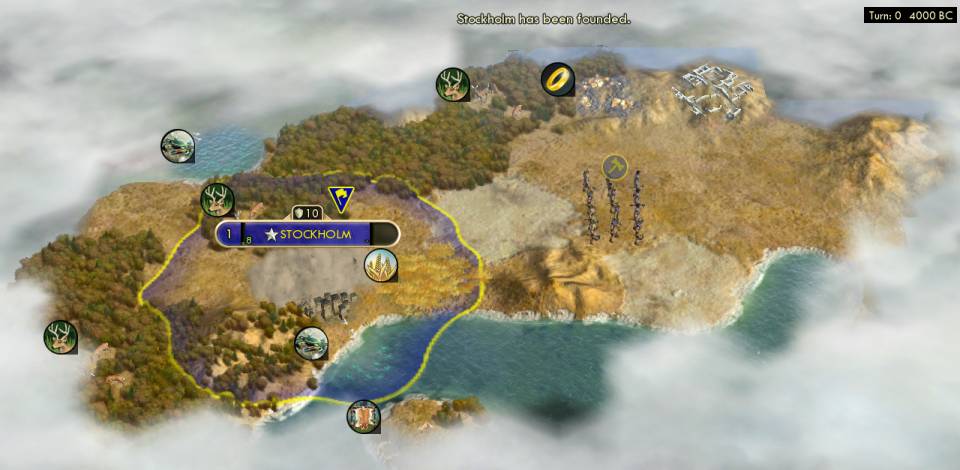
I got a great haul from ruins: no culture, but all of Mining, Archery, and Calendar! And population to size 3 on turn 8 just after Stockholm grew to size 2, nice timing and nice research bump. Later ruins to size 5 as well. Build order scout - scout - granary - archer - work boat - work boat - lighthouse - settler - chariot archer - settler - settler - Hanging Gardens.
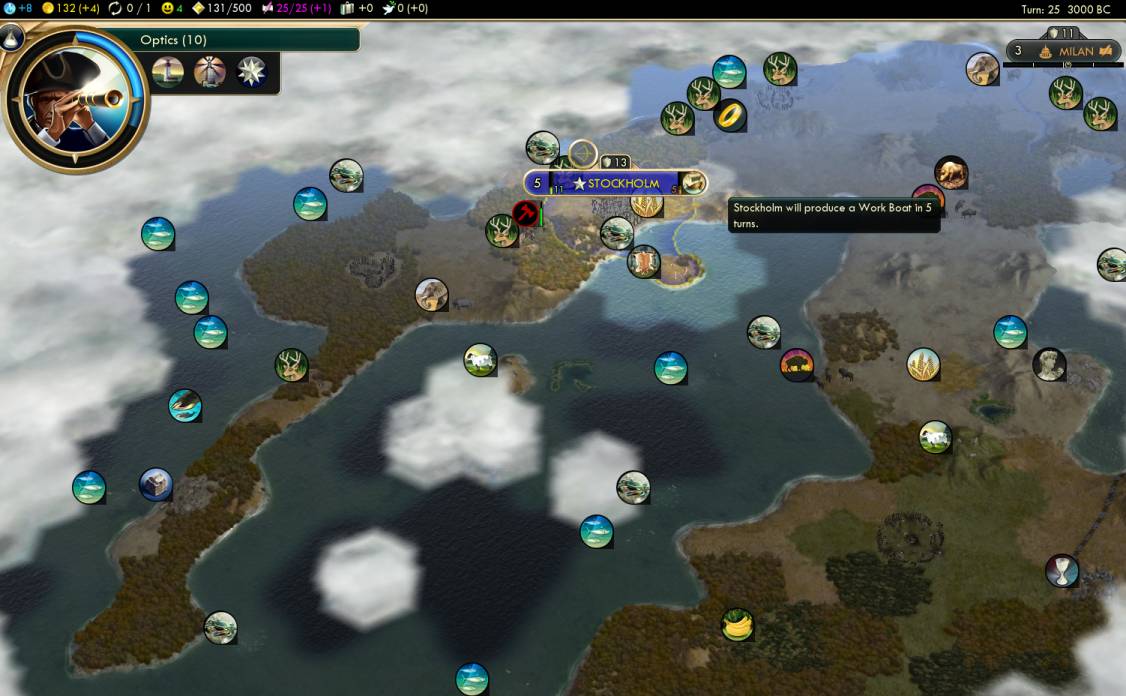
Here's the layout of my land, a weird sandbar for a pangaea. I wasn't expecting this on a pangaea map, but indeed I got a perfect setup to take the fastest route to the classical era in Optics. I got there about as fast as physically possible, turn 35. The lighthouse would be worthwhile enough to justify the research, and embarkation would help move settlers faster. I also went for God of the Sea as my pantheon, crazy as that sounds on a pangaea too but look at all that lutefisk.
The classical era entry went fast, but other aspects went slow. It took until turn 30 to get a luxury (crab) improved and sold, turn 41 to purchase a worker, and turn 50 to improve and sell a strategic resource (horses).
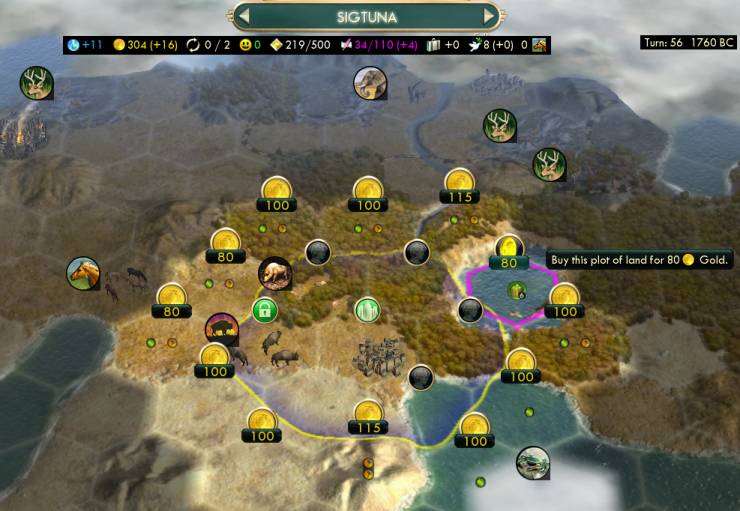
City two, which would start slow but get faster once it got that natural wonder for 6 food. But this is really weird - why does every tile here cost 80, why isn't there any choice at the normal base price of 50? Also annoyingly, despite that huge food production, Lake Victoria does not count as fresh water for irrigation or Garden purposes.
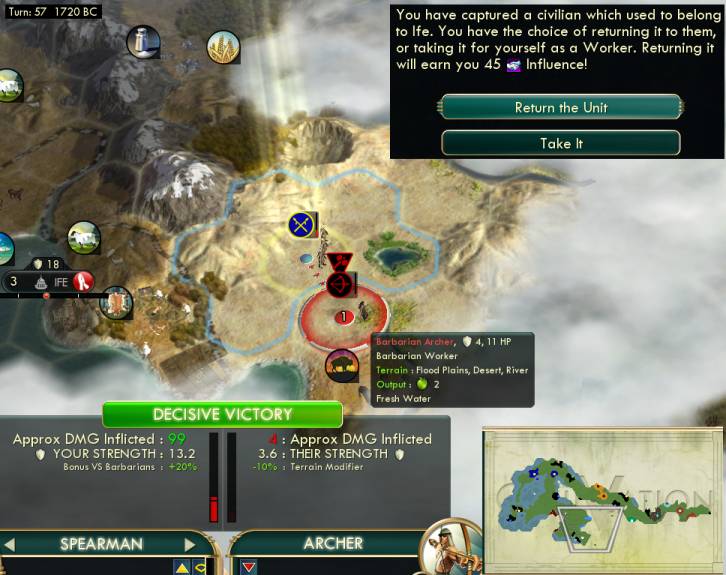
Here's a lucky break. My exploring warrior (ruins-upgraded to spearman) came across a kidnapped city-state worker ripe for retrieval. Tough choice on whether to keep it, but I gave it back. Ife is a religious city-state, so their friendship would be good enough to get me to the pantheon. Kicking in God of the Sea earlier would indeed be worth more than the worker itself, so this was the right move.
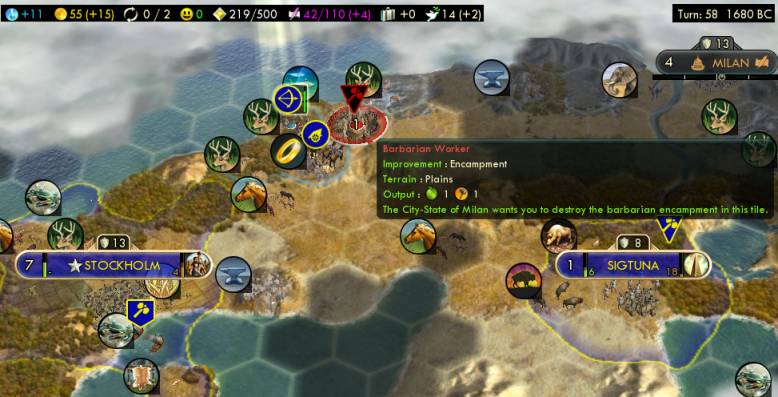
Besides, I had a legit worker grab back home as well -- and this one I was definitely keeping.

And I kept lucking into three more worker retrievals! I returned all for the influence. Well, I was going for a city-state oriented game plan. Not exactly the way I drew it up, but I'll take it. Tyre in particular was quite timely for happiness as I was pushing out settlers now.
 Hey advice guy, what the heck is with that dumbass suggestion - build a farm on bare desert?
Hey advice guy, what the heck is with that dumbass suggestion - build a farm on bare desert? 
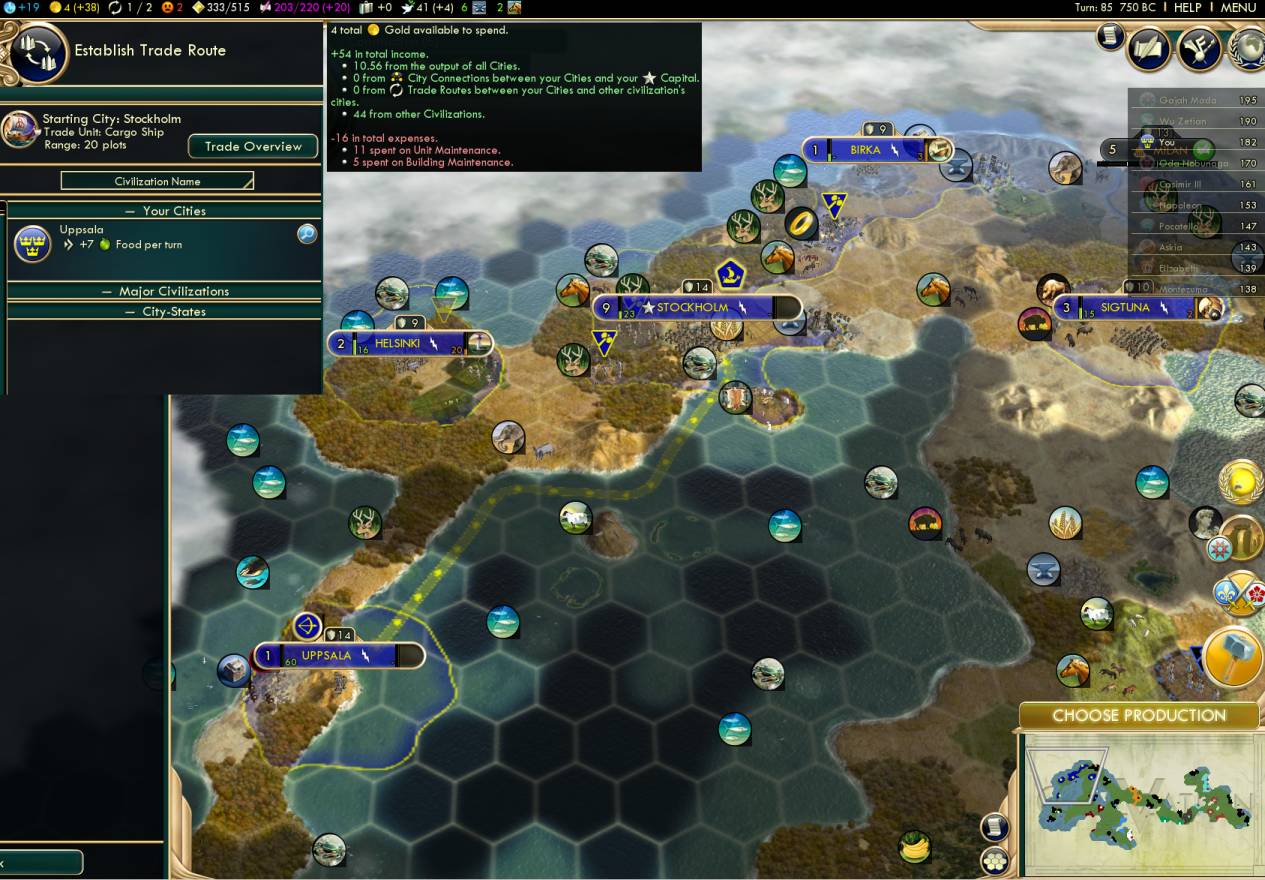
Here's my first trade route getting established, which will also serve as an overview shot. Obviously, 7 food will accelerate a city like Uppsala precipitously. Trade routes are supposed to be for gold income... but I don't need that, look at my budget. +38 per turn thanks to 44 from other civs. That's what happens when the capital has 14 units of strategic resources and Birka has 6 more iron, and I diligently sold them all one at a time for the 2 gpt quasi-bug. Resource sales still beat every other way of earning money. This was true in Civ 5 all along, but it wasn't as obvious pre-BNW when the sales were for lump sums. Now selling all the resources for gold-per-turn makes the income very visible. With the money, I bought the settler that became Uppsala, then the work boat for the crab at Helsinki, then also Helsinki's granary in order to send food to Birka.
The naval lanes were rather awkward. Trade routes from Stockholm can't reach the northern coast cities or Sigtuna on its enclosed sea. I worked around this by just having Helsinki and Birka trade with each other instead, and Sigtuna trade with another new city later on that lake. Stockholm also couldn't provide them work boats (usually terrible payback, but fine with God of the Sea) and they had to build or buy their own. But hey, this peninsula actually looks pretty well like Scandinavia in real life, nicely on theme.
Filled in classical techs, then Mathematics, then Iron Working for Colossus but that was a mistake, didn't build Colossus until a bit later, should have gone for Construction and lumbermills first. In fact then I missed the Colossus by ONE TURN! That hurt, the Colossus is pretty big in the BNW expansion... if you think about it, it even overshadows the Hanging Gardens by a considerable margin, the trade route is both more food straight-up and better leveraged in directing the trade route to the most needy city.
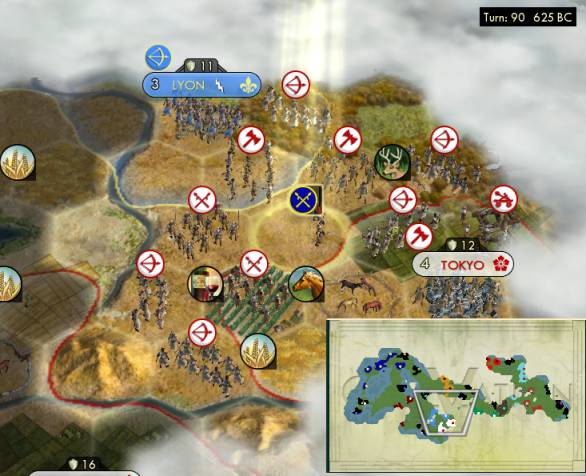
Japan attacked France, and I happened to have a unit there to see it. We always like to see AIs burning units on each other. But man, I play down on Emperor to avoid the carpet-of-units syndrome...
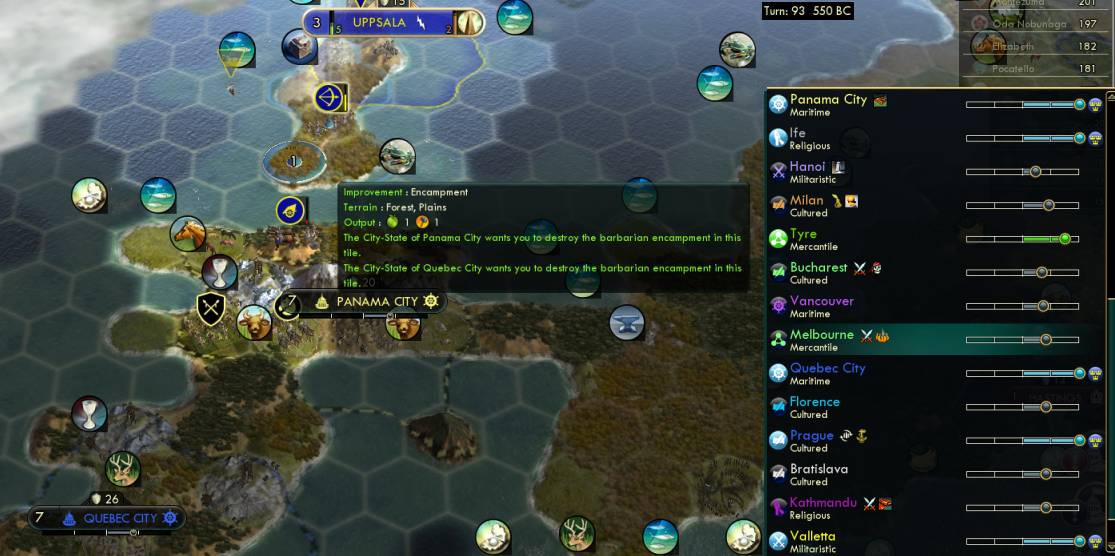
I got a nice two-for-one on this barbarian camp to please these two city-states, both maritime so let the food roll in. I'm playing exactly the city-state game I wanted, with five allies already -- although that came to be just by quest luck and not in the way I planned with Sweden's civ trait. Once again, Civ 5 is a game not where you make things happen, but where things happen to you.
You can see in the shot the elevated influence bars from Consulates (+20 to resting point), and indeed I had Patronage rolling by now. The order was T48 opener, T70 Consulates, T103 Scholasticism for a significant boost of 13 beakers, T124 Cultural Diplomacy, and T128 was the finisher by way of the Oracle. Interesting detail: newly-met city-states start right away at the elevated 20 resting point, something you usually don't get to see, getting that far into Patronage usually comes later after you've contacted them all.
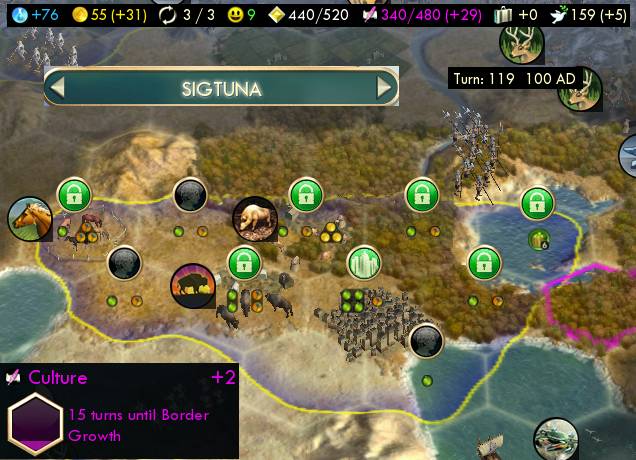
One annoying bit in BNW is how city culture production got inadvertently nerfed hard. The amphitheater line of buildings now always produce just 1 culture unless populated by a Great Work. But it's not just the nerfed building itself, it's also the lack of the artist specialist slot. Cities like Sigtuna here literally cannot get more than 3 culture per turn short of building a wonder. I had the Guilds slated to go into other cities that had more food to support the specialists. This makes it damnably hard to expand borders in cities like this one - there's no culture to be had at any price at all, the only thing you can do to get tiles is buy them.
Well, there's one method. My religion came, fairly late on turn 132 425 AD. One way for culture is the Choral Music follower belief, +2 culture for temples. I also considered Pagodas for the same purpose, but decided against it; as I've mentioned before, every time I take a faith-building belief, it ends up going unused over just buying missionaries instead. Religious enhancement came next with the Hagia Sophia prophet, standard stuff in Religious Community and Religious Texts.
The way to get my rather late religion spread around would be Borobudur for the missionaries. But:

ARE YOU FREAKIN KIDDING ME, that's the SECOND WONDER I lost by ONE TURN. And since I was verging on the Renaissance, the missionary cost would rise and it would take approximately forever before I managed to get the religion to even all my own cities.

Presently came my first Great Writer and now we finally get to do the actual game plan. The mechanics of Sweden's "Nobel Prize" ability are not quite obvious: it works through the "gift a unit" option on the city-state dialog screen. It does not work like a Great Merchant trade mission; the great person does not have to travel to the city-state. It does incur the same 3-turn delay before awarding the influence as does a regular gift of a military unit. There's no real notification that Sweden's ability was used, it just shows up as a standard "you got influence" notification.
I also got my first Great Person reward from the Patronage finisher. And was reminded that this "reward" can hurt you, since these Great People do increase the main cost counter for engineers/scientists/merchants. So it was here, since it was a not-so-useful Great Merchant. I went to settle him, then realized that I should just gift him right back through Sweden's ability as well. 9 total food per turn from a maritime CS obviously way beats 3 gold from settling. The second such "free"-nope-screw-you GP came later, that one an Engineer that settled. Later on came another Merchant and an Admiral, both also gifted back.
After finishing Patronage, I had on turn 136 one more policy to burn before reaching the Renaissance for Rationalism. The Aesthetics opener (+25% GPP for the three artistic types) was a perfect fit. I later continued all the way through Rationalism as usual.
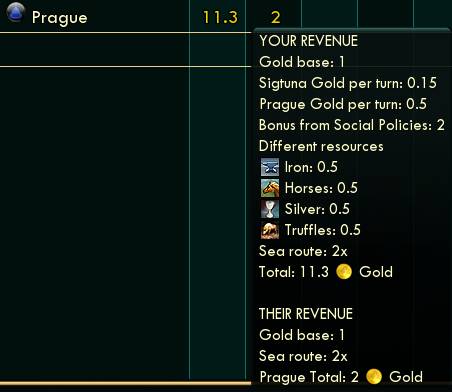
In the trade route department, I ran mostly food routes as usual. But I spared them for city-states when they wanted for a quest. There is a policy in Patronage for +2 gold per trade route... that I now discovered applies before and is multiplied by the 2x sea route modifier! Hmm, if the Treasure Fleets policy in Exploration (+4 gold for all foreign sea routes) also works this way, that might indeed be more attractive than I'd thought.
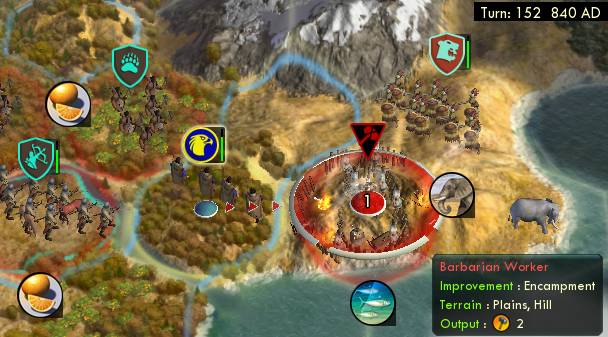
Ha, yet another randomly lucky worker retrieval. This one belonged to the Shoshone and I returned it. I do have to wonder why the AIs are so dumb to keep losing all these workers all the time. The game knows how to identify this, since when any of the player's workers comes in danger, it automatically wakes up to be told to run away. Best guess is that the AI is terrible at actually running away, unable to perceive where safety really is in relation to the possibl paths an invading unit could take.
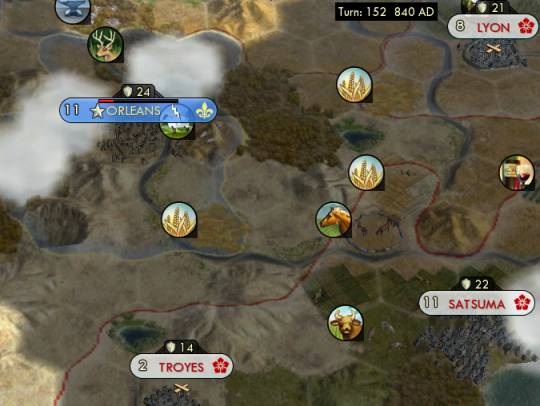
So here's an interesting chapter, nothing really to do with the main game plan, but perhaps worth relating anyway. Japan was conquering France, and I noticed Napoleon's last city just about to die.

I alertly overpaid for his only Salt, to trigger two CS quests and one WLKTD, knowing the deal would be terminated by his death.
But then Japan didn't conquer the city for a few turns, despite it being redlined. I had a unit wandering around the area. So I couldn't resist going for this...
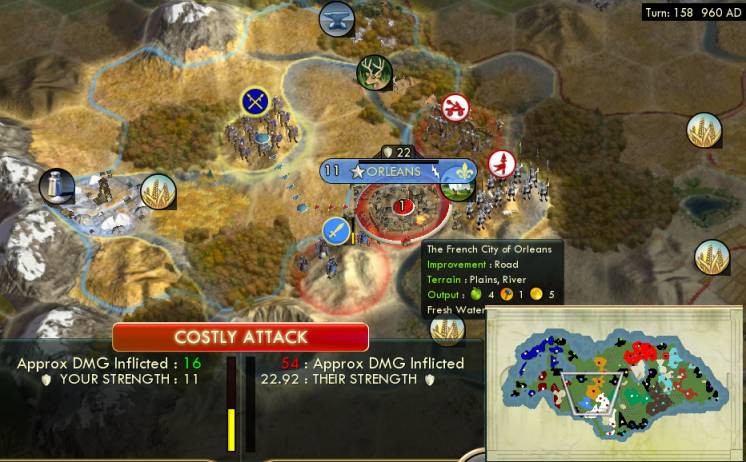
Grabbed the city for myself!
I'm fully aware this probably wasn't a good idea. At best, the city would break even against its policy and science and happiness costs. And of course the warmongering aggravated the other AIs. But heck, let's just do this for the entertainment factor to see what happens. The other AIs weren't really being friendly with me anyway. I'm fully aware this city presents a gigantic target... but at this point I actually kind of wanted to get attacked just to liven things up, I haven't had a single war declaration in BNW yet.
The next day I realized my mistake. I should have bribed everyone else into war on France, to avoid the warmonger penalties and pick up common-foe kudos. Yes, the diplomatic system is manipulable, more so than in Civ 4, but only if you remember to manipulate it, heh. Anyway, I did annex the city a bit later. It even came with Desert Folklore for the desert, heh.
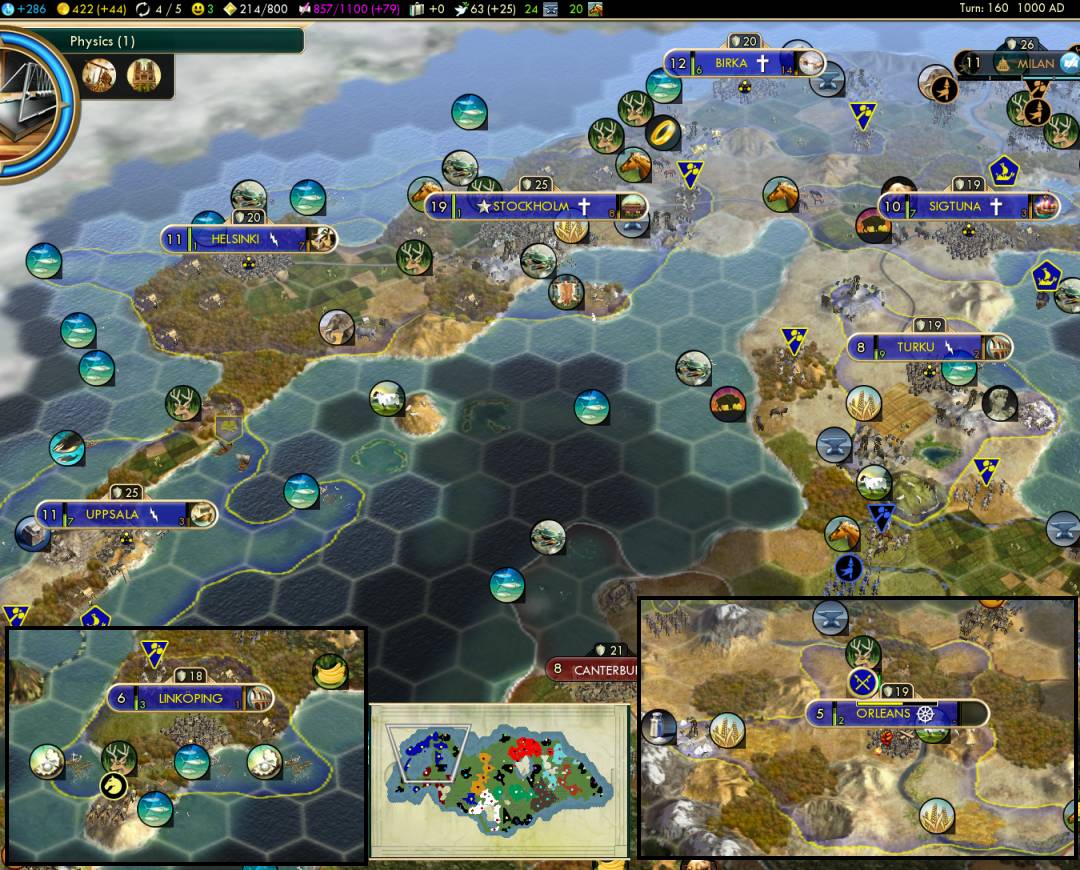
1000 AD overview.
Turku was supposed to build Petra, but that was pretty dumb, it got like 50 hammers in before Songhai completed it instead. Turku wasn't a great city minus that wonder, but kind of held its own anyway. Actually its most useful role was as a sea trading partner for Sigtuna.

I reached the industrial era with Scientific Theory on turn 179. My game plan was in full swing now, steadily gifting all the artistic great people to city-states. I started with maritimes, then onto cultured and religious CS that were now providing more than half my culture and faith.
I don't know what midgame research a diplomatic victory needs? Public schools obviously, but is there anything else? I wasn't in a rush for ideologies (Rationalism would come first), so Industrialization could be skipped. So I just researched directly up to Radio for the modern era, reaching it on turn 195. (You can pass through the industrial era fast, in just two techs of Scientific Theory and Electricity to reach Radio. This happens a few other places, like Mathematics - Currency - Guilds through the classical era, but the industrial era is the spot where it tends to keep happening. Because any kind of tech victory wants to prioritize Scientific Theory, it's then faster to get to ideologies just by researching up to Radio rather than sidetracking to Industrialization for the factories.)
The modern era meant choosing an ideology. I don't know what the standard pick is for diplomacy, and decided to wing it for myself rather than looking up anything. I came to the conclusion of Order, even though the game says that diplomacy is the one victory type that Order isn't suitable for.
It turns out that the recommended victory types for the ideologies really only consider the level 3 tenets and not the whole trees. Each of the three ideologies has one level 3 tenet geared for each of its suggested types. That's the tourism or spaceship part bonuses and so on. So, for diplomacy, you're supposed to use Gunboat Diplomacy in Autocracy or Treaty Organization in Freedom to acquire the city-states. But the reality is that acquiring city-states is easy (obviously even more so for Sweden) and isn't the limiting factor. The real long pole for diplomacy is research, just the same as a space victory. And so Workers' Faculties is the biggest research help in any of the ideologies, and Skyscrapers is also very strong to buy the research labs in particular.
Workers' Faculties turned out to be a dud anyway, for two reasons. First, I didn't even get to the level 2 tenet (after Rationalism) until after finishing research up to the information era. Second, it turned out that I had no coal anyway for the factories! I could only wait for some of the city-states to get the tech to supply it (and I still don't know the mechanics of how CS get techs, but here it happened when I reached the information era myself.)
To get to the Information Era, I went up the top of the tree to Telecommunications. The cheapest path is actually Satellites, which needs one fewer Atomic era tech. But that doesn't go through research labs and Telecommunications does, so the slightly more costly path did seem faster.
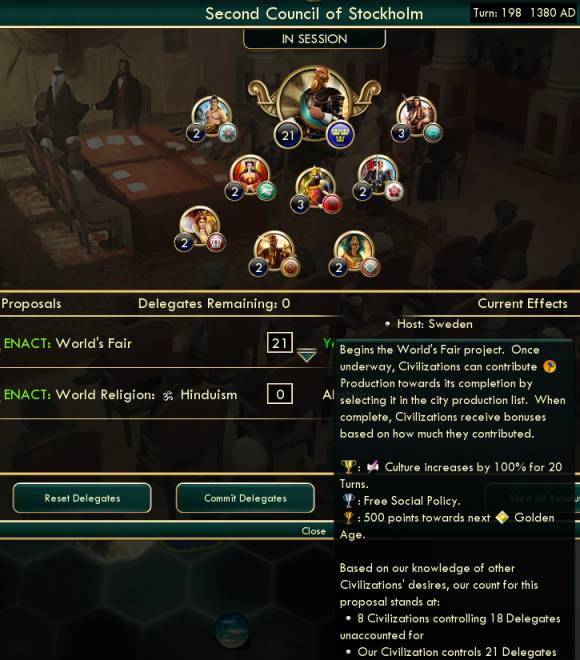
World Congress, I had picked the World's Fair on the first round, since three civs were in favor (Poland, England, Shoshone.) It then turned out that I zoomed up to the modern era before that vote even happened. That kicks in the delegates from city-states. So I voted in the World's Fair all by myself. And I won the fair too, although it didn't finish until after the research was done so the policies never mattered. For the second round, I picked World Ideology: Order, since that would award an extra 2 delegates, and passed that myself too.
I used the Rationalism finisher to get to Plastics, on turn 212. I'd saved gold before that and Skyscrapers did indeed help buy the r-labs. I also bought two Great Scientists with faith to make a total of six. I bulbed them all now which neatly finished right up to my goal, using Oxford University to claim Telecommunications itself. I also continued on to Globalization with another scientist that spawned just after.
Since Civ 5 loves to stick late game busywork at you, I'm going to stick some of that in the report, to convey the full experience.

Here's an annoying one. I discovered Archaeology while that worker was building a lumbermill there. He stopped building the lumbermill and couldn't be ordered to continue! Turns out that the appearance of the "resource" prevents you from executing any other improvement order. Because you're not allowed to build a "wrong" improvement on any resource. Dumb mechanic.
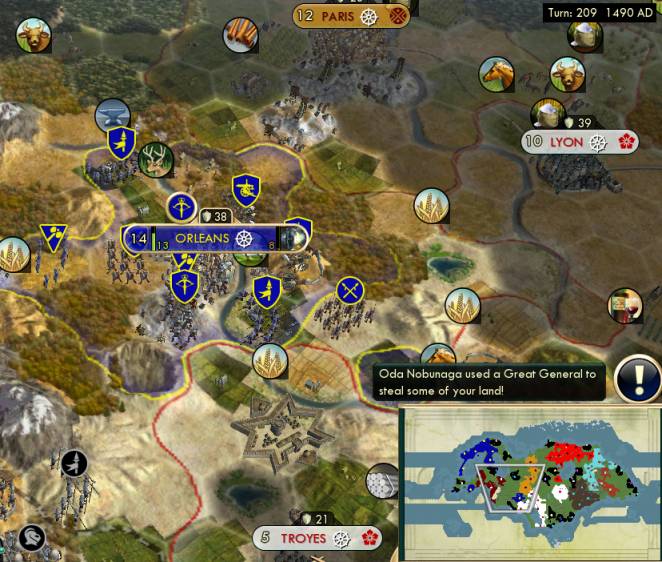
And another. Tokugawa used a Great General to steal some land. I didn't even know the AIs did that. But his aim wasn't very good, all he got was two floodplains, one with wheat. Orleans had already grown to most of its max size so that hardly mattered.
You can also see in that picture Paris and Lyon owned by colors other than France's blue. There were quite a few AI-AI wars in this game. France had lost early (with the elimination by my own hand), then China went too. Poland, Indonesia, Songhai, and Japan (but surprisingly not Aztecs) all started capturing cities from each other. Songhai got the worst of it and also died near the end. Fine by me, thin out the rival field of delegates. I had one close AI friend in Poland, who stayed friendly all game, buying all my resources and research agreements. Japan was mostly pleasant too thanks to shared-foe status for us against France. The other AIs all got offended from my capturing the French city, but none ever declared war or did anything more serious than denouncing.
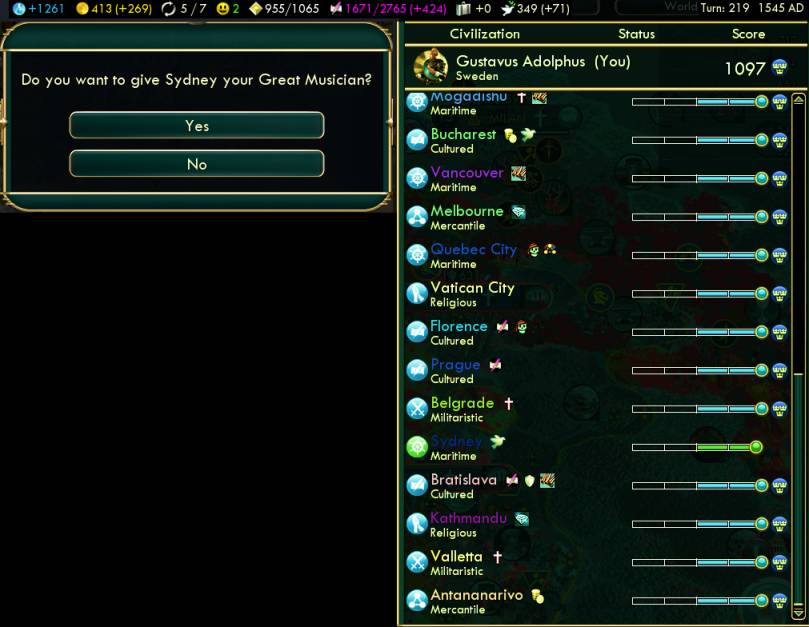
As I approached the information age, I conveniently got a Great Musician (my fifth or so) just perfectly to give to that one last unallied city-state. Now I had all twenty allied.

And with the city-state delegates, I voted myself host again. The United Nations for the diplomatic victory comes available when half the civs reach the Atomic Age or one reaches the Information Age, which just happened now. And the screen helpfully tells me when the World Leader vote will be, in 16 turns.
That's 16 turns of, well, nothing. Built a bunch of useless buildings and adopted a bunch of useless ideology tenets, up to Iron Curtain feeding a bunch of production trade routes to Stockholm for some uselessly late wonders (Cristo, CN Tower). This is of course perfectly usual in Civ 5; there's so many lategame buildings and wonders that can just never pay back their own cost before you reach a win condition.
It's almost like Civ 5 isn't even meant to be played to victory. It's meant to be played casually messing around, throwing together whatever buildings and policies and such look good, never mind if their payback is useful or not. If you reach a win condition, good for you, but probably the substantial majority of casual games never really come anywhere near an actual conclusion before getting bored or abandoned. The game really isn't designed for optimized focused play. A good player simply cuts off the last third of the tech tree every time via either Great Scientist bulbs or a culture victory. There's never any alternative path or opportunity cost to prevent that and have you really play out the endgame.
The last stages of the diplomatic victory are boring indeed, there's nothing relevant to do while you just wait for that clock to tick down. And it's kind of silly what optimal speed play would involve: intentionally found the World Congress late, then zoom up to the information era just before that first 30 turn clock expires, so you can get to the world leader vote as fast as possible. I doubt I'll do any more games for diplomatic wins; despite the hype around the World Congress, it isn't any more interesting than in the previous expansions.

Diplomatic Victory on a nice round turn 240, 1650 AD.
I didn't stress it much in the report, but Sweden actually did work pretty well with the city-states. I got all of them smoothly by the end of the game, which is something even Greece or Siam usually don't quite manage. Sweden might even pull itself into contention as a candidate for fastest-finish play in diplomacy. I'm not sure if the ability kicks in early enough on the growth curve to put Sweden on top, but perhaps a focused beeline to the writer's and artist's guilds could do it. Sweden can also get a bonus towards the Great Scientists with more friendships (I only had the one).
The one thing that went wrong here as a fastest-finish game was the Patronage finisher. You definitely want to AVOID that, it's actively harmful in bumping the main cost counter and therefore consuming great person slots away from scientists. In light of that, I'm pretty sure the best policy path would be the same as it always was: full Tradition, a few policies into Patronage, then Rationalism all the way as soon as it opens, which would also get to Workers' Faculties sooner.
That's all for now, but I do have more games in mind.